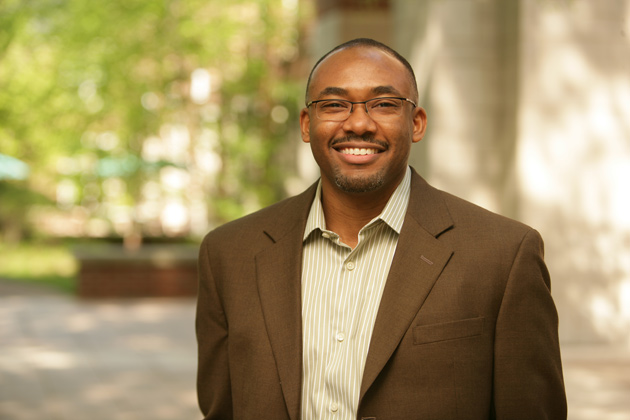
Interim Chancellor and Provost Susan R. Wente today announced the appointment of William H. Robinson as Vanderbilt’s vice provost for academic advancement and executive director of the Provost’s Office for Inclusive Excellence.
Robinson, who most recently served as interim vice provost for strategic initiatives, will continue leading the university’s efforts to build and sustain a culture of inclusion, belonging and respect in the university’s trans-institutional research and educational missions, including academic affairs, faculty affairs, admissions, research and more.
“During his time in the Office of the Provost, William has built strong relationships across the university and the extended community, and he has elevated inclusive excellence in all areas,” Wente said. “His wide-ranging expertise and proven track record of transformational leadership will help to further inspire and cultivate inclusion, belonging and care throughout our community. His leadership is critical to shaping our community’s action as we chart a path forward to continue to fight racism and injustice.”
While serving in the Office of the Provost for the past year, Robinson has worked closely with Vanderbilt’s 10 colleges and schools on initiatives that promote the recruitment and retention of historically underrepresented scholars, as well as partnering with the Office of the Vice Chancellor for Equity, Diversity and Inclusion, led by André L. Churchwell. Robinson and Churchwell co-chair the University Diversity Council, launched by Wente last fall.
Robinson also leads the Academic Pathways Program, which transitioned to his office this spring. The program offers the Provost Postdoctoral Fellowship to create a bridge between academic training and entry-level faculty positions for recently graduated doctoral students and law students from a diverse array of backgrounds and experiences.
In his role as vice provost for academic advancement, and through his leadership of the Office for Inclusive Excellence, Robinson will continue partnering with the Office of Faculty Affairs on faculty equity initiatives, such as the inclusive search workshops for members of faculty search committees. He also will work with the Office for Planning and Institutional Effectiveness to measure and assess the implementation of initiatives to improve equity, diversity, inclusion and access across academic affairs.
As vice provost and executive director of OIE, Robinson plans to center his approach going forward around three guiding principles: academic advancement, belonging and inclusivity, and cultural awareness demonstrated by education and practice. Through the Office for Inclusive Excellence, Robinson will continue to provide leadership for the identity centers, identity initiatives such as InclusAbility, and engagement across campus aimed at fostering inclusion and belonging. He also will further the university’s efforts to establish new initiatives to support first-generation and lower-income students.
“I am excited to have this opportunity to continue serving the Vanderbilt community in this new and expanded leadership capacity. As we seek to innovate, discover and create a better world, we must understand that our success is based on us first working to create a welcoming, inclusive community that recognizes the humanity in each of us and embraces differences with respect,” Robinson said. “I look forward to engaging with many colleagues, students and postdoctoral scholars at Vanderbilt to translate our values into action. A first step toward action will be a series of community engagement initiatives, including listening sessions that I will be co-hosting in the coming week with students, faculty and postdoctoral scholars about racism and injustice in our community and in society at large and what tangible actions Vanderbilt must take to bring about change.”
Robinson is a professor of electrical engineering and computer engineering and formerly served as associate dean for academic success for the School of Engineering. He leads Vanderbilt’s Security and Fault Tolerance Research Group and co-leads the Explorations in Diversifying Engineering Faculty Initiative. He is co-editor of a new book, Diversifying STEM: Multidisciplinary Perspectives on Race and Gender.
Robinson previously served on then-Chancellor Nicholas S. Zeppos’ Committee on Diversity, Inclusion and Community and was the recipient of a Chancellor’s Award for Research on Equity, Diversity and Inclusion in 2016 for his work to broaden minorities’ participation in engineering, which informed the understanding of factors that often discourage black scholars from pursuing academic careers.
Among Robinson’s professional honors, he is the recipient of a National Science Foundation Faculty Early Career Development (CAREER) Program Award, and he was selected for the Defense Advanced Research Projects Agency Computer Science Study Panel. He is a senior member of both the Institute of Electrical and Electronics Engineers and the Association for Computing Machinery. He is also a member of the American Society for Engineering Education, a lifetime member of the National Society of Black Engineers, and a member of 100 Black Men of Middle Tennessee, Inc., for which he currently serves as chairman.
Robinson joined the Vanderbilt community nearly 17 years ago as an assistant professor in the Department of Electrical Engineering and Computer Science. In 2010, he became the first African American to earn promotion with tenure in the School of Engineering’s history, and in 2018 he became the first African American to earn promotion to professor. He holds a bachelor’s degree in electrical engineering from Florida Agricultural and Mechanical University, a public, historically black university in Tallahassee. He went on to earn his master’s in electrical engineering and a subsequent doctorate in electrical and computer engineering from the Georgia Institute of Technology in Atlanta.